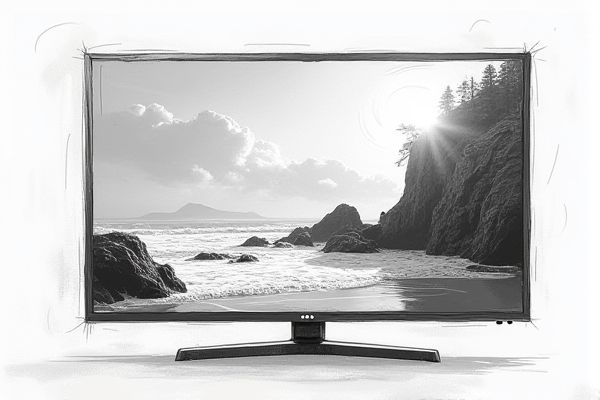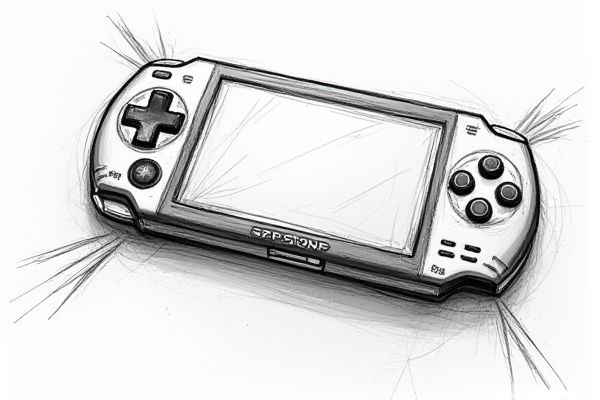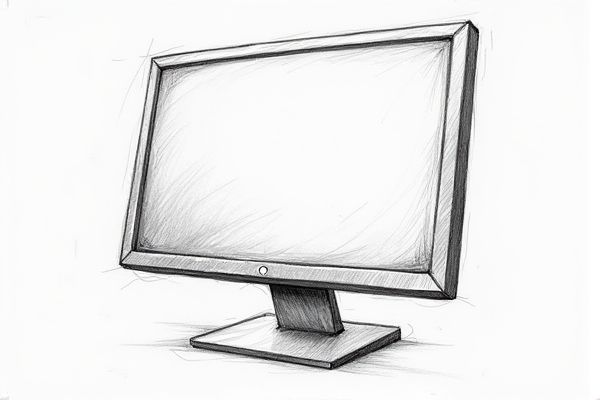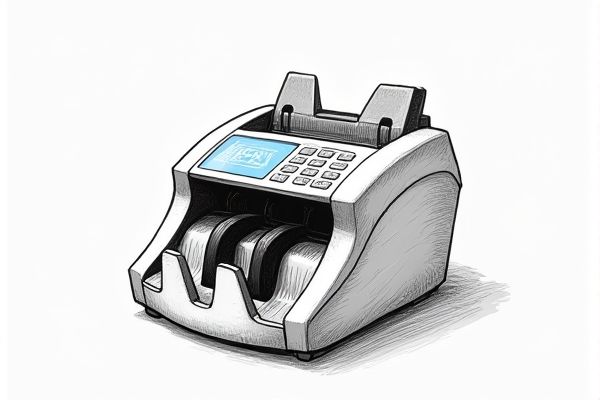In today's ever-evolving world of television technology, QLED TVs have emerged as frontrunners in providing vibrant colors and unparalleled picture quality. Known for their Quantum Dot enhancements, these TVs offer a brightness and color precision that make them a popular choice among consumers. Many brands have mastered the art of QLED technology, each bringing its own unique innovations to the table. To uncover the top contenders in the realm of QLED televisions and see which brand might best suit your needs, read the list below.

Illustration of qled tv
Best brands of qled tv in 2025
Samsung
Samsung Electronics has solidified its position as a leading producer of QLED TVs, maintaining a 30.1% share of the global TV market in 2023 and extending its dominance to 18 consecutive years. The company's QLED lineup, including Neo QLED models, has surpassed cumulative sales of 40 million units since its introduction in 2017, with 8.31 million units sold in 2023 alone. Samsung's QLED TVs capture 57.5% of the total QLED market, and the company holds a significant market share in the premium and ultra-large TV segments, including 60.5% for TVs priced above $2,500 and 43.9% for TVs over 80 inches. For further insights into Samsung's market performance, visit Samsung Electronics QLED dominance.
Sony
Sony is a leading producer of high-quality QLED TVs, known for their excellent picture quality, motion clarity, and deep contrast due to advanced local dimming features. In 2022, Sony sold 8.5 million TVs, highlighting their strong market presence. Their QLED TVs, such as the A95K model, offer superior color volume and HDR brightness, making them a top choice for consumers. Sony's electronics segment, which includes TV sales, generated ¥858.84 billion (about $5.023 billion) in fiscal year 2022. The company's commitment to innovation and customer satisfaction has solidified its position in the global smart TV market.
TCL
TCL has emerged as a leading producer of QLED TVs, known for its high-quality products and aggressive marketing strategies. In Q1 2024, TCL achieved a 12.6% global TV market share, up from 11.9% the previous year, and saw a significant 58.8% year-on-year increase in QLED TV shipments. The company's QLED line offers an exceptional viewing experience at affordable prices, making it a top choice for consumers. TCL's MiniLED technology, introduced in 2019, has also gained traction, with shipments surpassing those of OLED TVs in the high-end segment. With its "Mid-to-high-end + Large-screen" strategy, TCL continues to expand its market influence. For more details on TCL QLED TVs and how to choose one, visit their official website blog.
LG
LG Electronics is a leading manufacturer in the TV market, particularly dominating the OLED TV segment with a market share of over 50% in the first quarter of 2024, shipping approximately 627,000 OLED TV units and accounting for 52% of the OLED TV market. LG's OLED TVs are known for their superior picture quality, with each organic LED serving as its own lighting source, and they have maintained a strong presence in the super-large TV market, including a 58.4% shipment market share for TVs 80 inches and above.
Hisense
Hisense has solidified its position as a leading producer of high-quality QLED TVs, ranking second globally in the high-end TV market with a 24% market share in Q3 2024, according to Counterpoint Research. The company has seen a significant 102% year-on-year increase in Mini LED TV shipments, surpassing OLED TV shipments. Hisense's ULED TVs, which incorporate quantum dots and Mini LED technology, offer enhanced color range and peak brightness of up to 1,500 nits. In 2023, Hisense's global TV shipment market share rose to 13.94%, with domestic shipments growing by 11.2% and overseas shipments increasing by 28.1%. For more insights on what to expect from TVs this year, explore this Consumer Reports analysis.
Vizio
Vizio is renowned as one of the top producers of high-quality QLED TVs, known for its affordable yet feature-rich products. In 2024, Vizio's revenue reached $1.68 billion, with a significant portion generated from its advertising business, which saw a 35% growth in revenue. Vizio's SmartCast TV OS boasts over 18 million active users and a 14% year-over-year increase in ARPU, contributing to a 27% annual increase in advertising revenue. The Vizio V-Series, one of Vizio's flagship lines, offers 4K UHD with Full Array Backlight, Dolby Vision HDR, and WIFI 6E compatibility, making it a favorite among consumers. Despite a 3.28% decrease in revenue from the previous year, Vizio remains a strong player in the smart TV market.
Philips
Philips is renowned as one of the leading producers of QLED TVs, offering exceptional picture quality and innovative features. Their 4K UHD QLED TVs, such as the 86PQT8169 model, boast vibrant colors through QLED technology, ultra-sharp pictures, and support for major HDR formats including Dolby Vision and Dolby Atmos. These TVs integrate Google TV for seamless content management and come with Google Assistant for voice control. The global smart TV market, which includes Philips' offerings, is projected to grow significantly, with the U.S. market alone expected to reach $90.738 billion by 2030, growing at a CAGR of 12.5% from 2024 to 2030. For detailed product documentation and specifications, you can access the Philips 86PQT8169 model documentation.
Panasonic
Panasonic is a leading producer in the smart TV market, particularly notable for its high-quality QLED TVs. In 2023, Panasonic released 23 new smart TV models powered by the Google TV platform, enhancing user experience with superior visual and audio capabilities. The company's partnership with Amazon in January 2024 further emphasizes its commitment to delivering tailored viewing experiences. Panasonic's innovations contribute significantly to the global smart TV market, which is projected to grow at a CAGR of 11.68% from 2024 to 2030. With a strong presence in the market, Panasonic continues to be a key competitor among brands like Sony, Samsung, and LG.
Sharp
Sharp Corporation is a notable player in the smart TV market, particularly for its collaboration with Roku TV to enhance home entertainment experiences. In January 2022, Sharp Home Electronics Company of America partnered with Roku TV to offer a premium home entertainment experience, including access to thousands of streaming channels and over 200 live TV channels. Sharp's innovations, such as the frameless 4K HDR TVs, contribute significantly to the market. The company's focus on future technologies, like QLED, positions it as a competitive force, especially with the QLED TV market projected to reach USD 75.0 billion by 2032 at a CAGR of 9.45%. For more details on this market's dynamics, you can visit the United States smart TV market report.
Sanyo
Samsung, not Sanyo, is one of the leading producers of QLED TVs, having maintained a dominant position in the global TV market for 18 consecutive years. In 2023, Samsung achieved a 30.1% share of the global TV market and a significant 60.5% market share for TVs priced over $2,500. The company's QLED TV lineup has surpassed cumulative sales of 40 million units since its launch in 2017, with 8.31 million units sold in 2023 alone. Samsung's QLED TVs are known for their exceptional picture quality and innovative features, such as the NQ8 AI Gen3 processor unveiled at CES 2024. This technology is set to redefine the smart TV domain with advanced AI capabilities. For more information about Samsung's leadership in the TV market, visit Samsung Electronics News.
















Leave a Reply
Your email address will not be published.